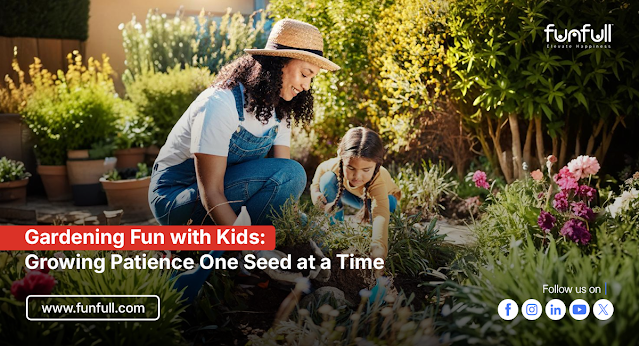Gardening Fun with Kids: Growing Patience One Seed at a Time
The Instant-Result Generation (And Why That’s Not Their Fault)
Today’s kids live in the fast lane—and not just because they run everywhere.
They can tap a screen and see a world unfold.
They can skip intros, fast-forward ads, and order a toy with a voice command.
And while tech isn’t the enemy, it does train one thing:
Impatience.
So you might laugh when your 6-year-old wants strawberries and asks, “Can we grow some today and eat them tomorrow?”.
But here’s the twist: that question?
It’s a perfect place to start teaching patience.
Because the ultimate patience dojo isn’t a meditation class or a timeout chair.
It’s a garden.
Why Gardening Teaches What Words Can’t
You can’t rush a seed.
You can’t microwave a plant.
And you can’t fake the time it takes for something to grow.
That’s why gardening is secretly one of the best emotional skill-builders for kids.
It teaches patience not as a punishment, but as a process.
And it does it through:
Waiting without knowing what day the sprout will show
Watering something even when it “looks the same”
Trusting the invisible work happening under the soil
Learning that progress isn’t always loud
It’s emotional regulation in disguise.
And it’s one of the most tactile, visual, and peaceful ways to build a slow brain in a fast world.
What Age Can Kids Start Gardening?
As early as 3 or 4.
They won’t be pruning roses or debating mulch types—but they will love:
Digging
Watering
Spraying
Watching
Naming their plant (“Sir Sprout,” obviously)
A 5-minute daily routine is all it takes to build rhythm, and rhythm is the root of patience.
What If You Live in a Small Apartment or City?
You don’t need acres. You need:
A pot
Some soil
A windowsill
And a starter seed kit (or heck, a sprouting potato from your kitchen)
Or take it to your local community garden for a weekly “plant check-in.”
And once you’re done? Swing by one of the bowling alleys near me in Virginia for a fun reward - because patience is best paired with a little play.
Bonus: 3 Simple Gardening Games That Build the Waiting Muscle
1. Sprout Countdown
Each day, guess how many days until the seed sprouts. No prize. Just bragging rights.
It shifts focus from “Why isn’t it here yet?” to “Let’s see how long it takes!”
2. Water Watchers
Pick one plant to water and another to leave alone for a week. Watch what happens.
It teaches consistency and consequences in a way no lecture can.
3. Growth Journal
Have your child draw or write a tiny entry each day about their plant.
This simple act builds self-reflection, observation, and emotional ownership.
Why This Works
Because it’s:
Physical (they touch it)
Visual (they see it)
Relational (they connect with it)
Repetitive (daily habits build deep skills)
And most importantly—
It doesn’t rush.
Just like patience.
Just like childhood.
Just like that slow bloom we all want them to grow into.
Where Funfull Fits In
At Funfull, we’re all about building better humans through joy, not lectures.
That’s why we highlight real-world activities, from outdoor family attractions near you to peaceful pit stops like bowling alleys near me in Virginia, where kids learn rhythm, fun, and self-control - without ever realizing it.
Whether you’re potting seeds on a balcony or rolling balls down a lane, Funfull helps you find the right pace, place, and vibe for your family journey.
Because they are the best parenting tools?
Aren’t in books.
They’re in the dirt.
In the game.
In the moments your child waits, watches, and slowly becomes.
FAQ
Can gardening really teach patience?
Yes. It’s slow magic. Kids water, wait, and learn that not everything happens instantly—and that’s the whole point.
What if my kid gets bored fast?
Start small. Use fast-growers like sunflowers or mint. Add tiny rituals (like naming plants) and reward the routine, maybe with a trip to a bowling alley near you in Virginia.
No backyard. Are we out of luck?
Not at all. A pot, a window, and some soil are enough. Or try community gardens and family attractions near you that offer planting zones.
Best plants to start with?
Easy wins:
Sunflowers
Lettuce
Mint
Beans
Visible growth = motivation.





Comments
Post a Comment